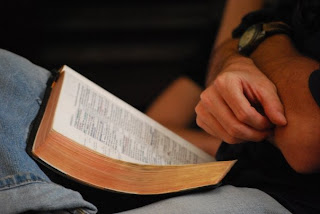The
problem here is that we have redefined the term “pastor”as it was intended in
the new testament to reflect our modern day ideas of what church should look
like. See, the noun “Pastors” only appears once in the new testament
scriptures, and then it is used in the plural sense, not the singular. Not only
that, the group of people called upon to “shepherd the flock”in the local
assembly are called “Elders” not “Pastors”.
Beyond
the obvious misuse of the word, the real danger is that we’ve completely redefined
the verb “to pastor” so that it no longer has anything to do with loving
people, caring for them, serving them, feeding them, strengthening them, making
sure they are spiritually healthy, or anything remotely close to what a
“shepherd” would do to take care of the sheep. Instead, we have reduced the
term “shepherd” or “pastor” into the most narrow function – leadership.
Pastor
Davis made the mistake of reading books and attending conferences and listening
to audio books about leadership so he could inspire people to listen to him, or
to motivate people to do stuff, or to convince people to invest in his church.
What should he have done instead? Well, if the function of being an elder (who
is part of a group of other elders) is to nurture the spiritual development and
growth of his brothers and sisters in the church, maybe the first thing would
be to spend time praying for those people? And then maybe you could spend time
with them? Perhaps you might decide to read books about how to listen more, or how
to encourage people? You might also want to try doing all of these things
without an ulterior motive like wanting to use your influence on people to get
them to do stuff, or to give you money, or to volunteer for something. Just
love them and listen to them and bless them and encourage them because you love
them, and because you genuinely feel called –and gifted – by God to care for
people.
See,
Pastors who are obsessed with leadership are like husbands who expect to
improve their marriages by reading books about monster trucks. Not only is
leadership not related to loving people, it will train you to become more
self-focused and less others-focused.
Books
about leadership make you a better leader – in the worldly, CEO, “I’m the boss”
sense of the word – but if you really want to learn how to please Jesus and be
the best “shepherd” you can be, just focus on learning how to love people more,
and to serve people more. It’s what Jesus did. It’s also what Jesus commanded
us to do. He got down on his knees and washed the feet of this disciples, and
then he said, “Now that you know these things you will be blessed…if you do
them!” (Not if you read them, or if you know them, but only if you “do” them).
Biblically,
a good shepherd or pastor is one who loves people and serves people and helps
people to depend more on Jesus. Good pastors do not train people to depend on
themselves. They constantly point others to Jesus and they teach them to hear
the voice of the One, True, Good Shepherd who is more than capable of speaking
to His own sheep and leading them where He wants them to go.
Pastoring is not about being a good speaker. It’s not about
being a good marketer. It’s not about motivating people to do stuff. It’s not
about being a smart business man. Simply put, pastoring is about loving and
serving people.
Don’t be like Pastor Davis. Be like Jesus. Get on your knees. Serve others. Wash feet. Teach people to look to Jesus, and to cling to Jesus, and not to yourself. Then you will be a good pastor, and you know what else? You’ll also be a leader who sets an example worth following.
Don’t be like Pastor Davis. Be like Jesus. Get on your knees. Serve others. Wash feet. Teach people to look to Jesus, and to cling to Jesus, and not to yourself. Then you will be a good pastor, and you know what else? You’ll also be a leader who sets an example worth following.
-kg
**
Thanks
to Aaron [@CulturalSavage] for his Tweet that inspired this blog.










